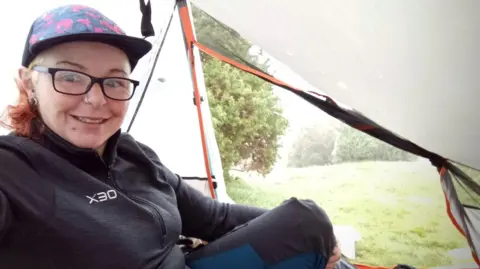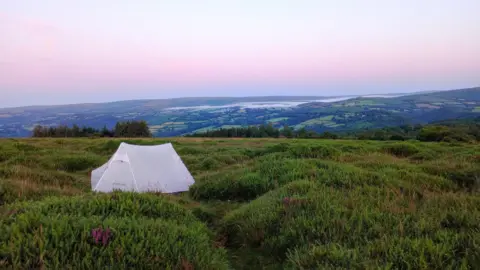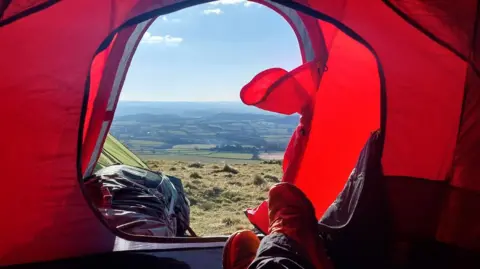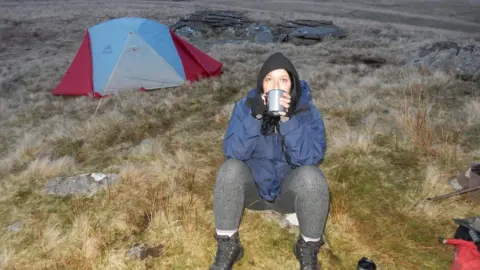'Wild camping teaches you so much, it's addictive'
 Becky Harrison
Becky Harrison"It can teach you so much, so much within yourself, and about the environment - it becomes addictive," said Becky Harrison of going wild camping.
The 52-year-old from the South Hams in Devon first tried it three years ago and "never looked back".
Wild camping involves sleeping in the countryside rather than in a campsite, and Dartmoor is one of the few places in England where it is widely permitted.
Earlier this week a Supreme Court judgement upheld the right for the practice to continue on the moor, after an unsuccessful appeal by two landowners.
 Becky Harrison
Becky HarrisonMs Harrison said she was "over the moon" about the judgement.
"It is a magical thing to do," she said of being out in the natural environment and sleeping under the stars.
"No harm can come to you, as long as you do it respectfully and learn how to walk on the moors and respect the moors," she said.
'I've never looked back'
She recalled her first experience as being a bit daunting as she "didn't even know where I was going".
"I researched it and I just went for it and from then on I've never looked back."
Ms Harrison, who is trained as a moorland guide, said wild camping had given her a number of memorable experiences including seeing the northern lights.
She believes it can give a "freedom, especially for young people" and can greatly benefit a person's mental health and wellbeing.
The Supreme Court ruling means that people are legally allowed to camp in set areas of Dartmoor if they follow a code of conduct.
Following the ruling, Dartmoor wild campers were urged to "tread lightly and leave no trace" by the park authority.
What are campers allowed to do?
- Tents and camping equipment must fit in a carriable backpack
- No more than six people are allowed to camp together
- Campers must blend into the landscape, out of sight from roads and buildings
- Maximum camping length is two nights
- No overnight stays in vehicles, campervans or motorhomes
- Leave no trace - do not light fires and take all rubbish away
 Marc Jeffrey
Marc JeffreyMarc Jeffrey, 48, from Landrake in Cornwall, said the activity opened his eyes to a new way of socialising after he temporarily stopped drinking as an experiment about three years ago.
"When I stopped going to the pub, I stopped seeing my friends," he said.
"For me, I love wild camping because it gives me a chance to meet up with a couple of my friends - it's a social activity and we've built a great little community.
"It's just an amazing thing to get out on the hills, see the sunrise, see the sun go down, it's just physically and mentally [good] for the body."
He said he was "thrilled" with the Supreme Court decision adding: "We should be like Scotland, where we're able to go and be responsible and pitch up a tent and leave no trace in the morning."
Wild camping has long been legal in Scotland under the Land Reform (Scotland) Act 2003, but in England there is no general right to wild camp on most private land, with Dartmoor being an exception.
 Amanda Higgins
Amanda HigginsAmanda Higgins said she had been wild camping on Dartmoor for just over a year.
"I go wild camping every weekend, even at Christmas, even in the snow," she added.
She said it was "very important to be responsible", adding dogs should always be kept on the lead.
For people dependant on their mobile phones, wild camping on Dartmoor may not be for them.
"Nine times out of 10 you've got no signal," she said.
"People spend way too much time these days on social media and scrolling."
Follow BBC Cornwall on X, Facebook and Instagram. Follow BBC Devon on X, Facebook and Instagram. Send your story ideas to [email protected].
